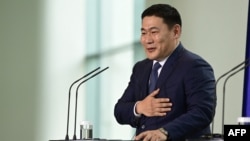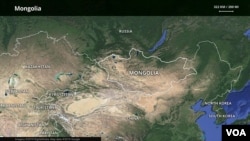Mongolian Prime Minister Oyun-Erdene Luvsannamsrai and Foreign Minister Battsetseg Batmunkh arrive in Washington on Tuesday to start their meetings with Vice President Kamala Harris, Secretary of State Antony Blinken and other senior U.S. officials this week.
“@VP (Vice President Harris) looks forward to welcoming Prime Minister Oyun-Erdene of Mongolia to the White House on August 2. The visit will highlight the strength of the U.S.-Mongolia Strategic Partnership and our ongoing work to deepen political, economic, and cultural ties,” said Harris’ press secretary Kirsten Allen in a message posted to the social media platform X, formerly known as Twitter.
This is the first official visit of a Mongolian prime minister to the United States since 2018.
The visit comes as the two countries are expanding cooperation on regional security and Mongolia’s deposits of rare earth minerals, which are crucial to the manufacture of high-tech items and renewable energy products, such as battery-powered electric vehicles.
In June, the U.S. and Mongolia signed a Memorandum of Understanding (MOU) to strengthen critical mineral supply chains in the Indo-Pacific.
Mongolia is a top global mineral supplier with 80 diverse deposits, including rare earth elements, copper, fluorite, gold, iron, and zinc. Rare earth element reserves in the country make up around 16 percent of the world's total.
Oyu Tolgoi, located in Mongolia's South Gobi region, is one of the largest known copper and gold deposits in the world.
“The U.S., along with many other countries, is eager to ensure a reliable supply of rare earth elements and other critical minerals for energy technologies, defense, and other uses,” said Tom LaTourrette, senior physical scientist of the RAND Corporation.
He suggested a good outcome from the visit would include an agreement between the countries for the U.S. government to move beyond “encouraging” private sector investment to incentivizing it financially, perhaps by including Mongolia as an eligible partner for the clean vehicle credit under the U.S. Inflation Reduction Act.
In May, Mongolia, South Korea and the United States addressed North Korea’s ongoing nuclear weapons development and numerous ballistic missile launches.
“It was the first trilateral meeting that we've had between our three democracies,” U.S. Ambassador to Mongolia Richard Buangan told VOA in a recent interview.
Mongolia is one of the few countries that maintain a close relationship historically with North Korea. Both nations have embassies in each other's capitals.
U.S. officials also told VOA that Mongolia, a landlocked country with 90% of its exports going through China, would benefit from diversifying its economy. Sandwiched in between Russia and the People's Republic of China, officials describe Mongolia as situated in “a geo-politically delicate position.”
Political leaders in Mongolia’s capital, Ulaanbaatar, “very much are following events in Russia,” said Buangan. “We obviously hope that they can continue to play a more constructive role as we seek an end to this conflict [in Ukraine] which Russia has started.”
Driven by a strong desire to maintain stable ties with Russia, Mongolia has opted for “neutrality” and has abstained from United Nations General Assembly resolutions that condemn Russia’s invasion in Ukraine.
The Mongolian delegation’s visit to Washington will focus on meetings with senior U.S. officials as the Congress is in August recess. Prime Minister Luvsannamsrai has no plan to make public remarks at Washington-based think tanks this week, according to diplomats.





